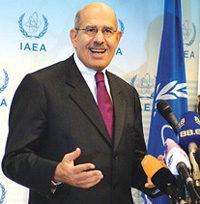Iran needs time to review plan calling for a time-out to sanctions, enrichment
Iran said Sunday it needed time to review a plan proposed by the head of the U.N nuclear watchdog that calls for holding off on imposing U.N. Security Council sanctions if Tehran halts uranium enrichment.

International Atomic Energy Agency chief Mohamed ElBaradei proposed the simultaneous time-out plan during the World Economic Forum in Davos, Switzerland in an effort to end the standoff over between the West and Iran over the Islamic Republic's disputed nuclear program.
"Time should be allocated to see if the plan has the capacity to solve the (nuclear) case," Ali Larijani, Iran's top nuclear negotiator, told reporters during a joint news conference with Russia's national security adviser, Igor Ivanov. He did not elaborate.
The Security Council last month voted unanimously in favor of imposing limited sanctions on Iran after it ignored demands to halt enrichment. Iran faces the prospect of additional sanctions unless it stops enrichment, which can produce material usable both as fuel for electricity-generating reactors and for nuclear weapons, by the end of a 60-day period that ends next month.
Though Iran says its nuclear program is peaceful, the U.S. and its allies believe it is secretly developing atomic weapons.
Ivanov said ElBaradei's proposal could be "remarkable" and was optimistic that the dispute could be resolved if both sides agreed to it.
"The situation of Iran's nuclear case is critical. Reducing its intensity is our aim," Ivanov said. "We are currently discussing to remove obstacles from the way of negotiations. All sides should show flexibility and avoid statements that worsen the situation."
Iranian state-run radio reported earlier Sunday that Tehran wants Moscow to help mediate the standoff, saying the country was looking to Russia for "new proposals, such as enrichment of uranium on Russian soil." Iran also expects Russia to "take a close stance with the international community," the radio said.
The Kremlin proposed last year that Iran move its uranium enrichment work to Russian territory, where it could be better monitored to alleviate the international concerns that Tehran is trying to build atomic bombs in violation of its treaty commitments.
Iranian leaders had said they were interested in the idea, but nothing ever came of it as oil-rich Iran insisted its nuclear project is intended only to produce radioactive fuel for reactors that would generate electricity.
State radio also said Russia pledged to complete the Bushehr nuclear power station on schedule this year. Russia last year agreed to ship fuel to Bushehr by this March and start up the facility in September, with electricity generation to start by November.
As a U.N. Security Council permanent member, Russia last month forced the body to water down proposed punitive measures that would have imposed curbs on the Bushehr project. But the Kremlin then supported limited sanctions against Iran over its refusal to suspend uranium enrichment.
Ivanov's visit came as Iranian officials issued contradictory statements about progress on expanding enrichment facilities by installing 3,000 centrifuges, which spin uranium gas into enriched material, at the Natanz nuclear facility.
Mohammad Saeedi, deputy head of Iran's Atomic Energy Organization, said Sunday that Iran was continuing its nuclear activity according to schedule.
"If we begin to install centrifuges we will publicly announce it," Saeedi said. Earlier Sunday, Hossein Simorgh, the spokesman for the Iranian nuclear agency's public relations department, also said new centrifuges had not been installed at Natanz, the official Islamic Republic News Agency reported.
Those remarks appeared to contradict lawmaker Alaeddin Boroujerdi, who said earlier Saturday that Iran was currently installing the 3,000 centrifuges.
Foreign Ministry spokesman Mohammad Ali Hosseini refused to elaborate on the discrepancy, saying Sunday only that the contradicting remarks were a "technical matter" that should be left to Iran's nuclear agency organization to "elaborate ... at a convenient time."
The IAEA had no comment on the Iranian centrifuge statements, spokeswoman Melissa Fleming said Sunday. ElBaradei said recently he believed Iran planned to begin work in February on an underground facility to hold uranium enrichment equipment.
A senior U.S. State Department official warned Iran on Friday against accelerating its atomic program, reports AP.
"If Iran takes this step, it is going to confront universal international opposition," Undersecretary of State Nicholas Burns said. "If they think they can get away with 3,000 centrifuges without another Security Council resolution and additional international pressure, then they are very badly mistaken."
For now, the only known assembled centrifuge operations in Iran consist of two linked chains of 164 machines each and two smaller setups.
Subscribe to Pravda.Ru Telegram channel, Facebook, RSS!




